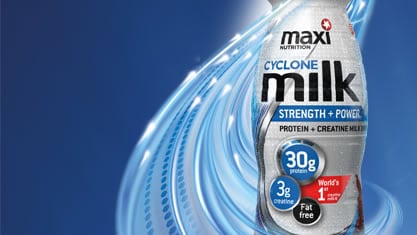Prompted by GSK, the UK Food Standards Agency (FSA), along with Food Safety Authority of Ireland (FSAI), to issue the recall on Friday saying the chocolate and strawberry ready-to-drink 330 ml bottles “may contain creatine particles due to re-crystallisation.”
“This means the product is a possible choking hazard and may cause injury to the mouth.”
The products were manufactured by a third party in Austria.
“sugar granule-sized”
A GSK Consumer Healthcare spokesperson said it had first received customer complaints in Q3 2014-15 that related to “sugar granule-sized” crystals in chilled Cyclone Milk products.
More recently larger crystals were reported, and although the firm’s medical team determined the adverse event reports were ‘non-serious’ in nature, it was decided to issue a full recall in conjunction with the FSA.
“We are working flat out with retailers and distributors to quickly implement this recall,” the spokesperson said. “A full investigation into the crystrallisation problem is under way. We spent two years developing this product and as yet are not sure why this is happening.”
Cyclone Milk production has been temporarily suspended.
The FSA stated the pharma giant had “taken the precautionary measure of recalling all MaxiNutrition Cyclone Milk 330ml products.”
“If you have bought the above product, do not drink it. Instead, return it to the store from where it was bought for a refund.”
The eye of the cyclone

GSK launched Cyclone Milk last summer after two years of R&D in which creatine stabilisation was central to its efforts, as reported by our sister site DairyReporter at the time.
It drafted international rugby players like England’s Courtney Lawes as brand ambassadors for the drink that contained 201 calories, 30 g of protein and 3 g of liquid creatine.
Other existing high-protein milk drinks, such as CytoSport Monster Milk, contain creatine but MaxiNutrition claims Cyclone Milk was the first to contain an optimum 3 g dose as per an EU-authorised health claim.
That European Food Safety Authority (EFSA)-based claim states: “Creatine increases physical performance in successive bursts of short-term, high intensity exercise.”
Creatine is a naturally occurring amino acid made by the human body in the liver, kidneys and pancreas. It converts into creatine phosphate or phosphocreatine and is stored in the muscles where it aids in replenishing Adensine triphosphate (ATP), which supplies energy for muscle contraction.
Earlier this year MaxiNutrition reformulated its powder range with a triple-protein formula of whey, milk and soy. Previously it had employed 100% whey.
That change applied to MaxiNutrition’s full range including Promax & Promax Extreme, Cyclone, Progain & Progain Extreme and Promax Lean ranges.
